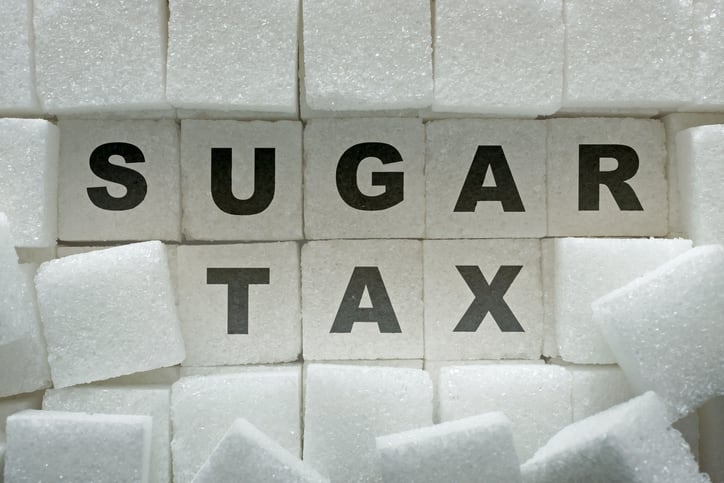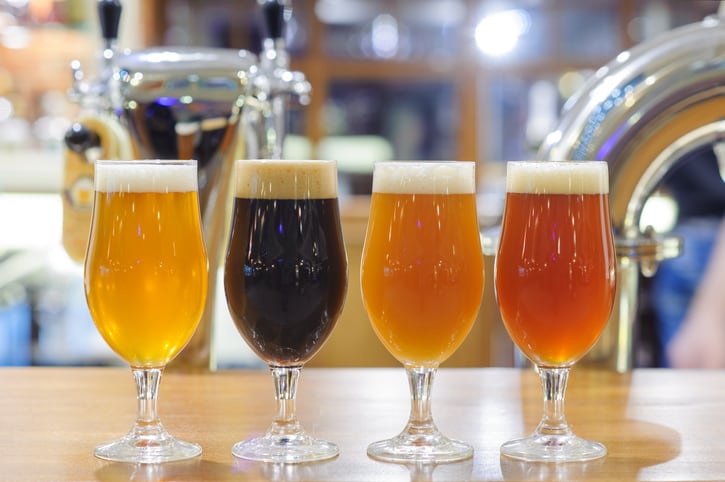The study, published in the journal PLOS Medicine, suggests that a flat rate tax on sugar-sweetened beverages in Germany could prevent or postpone cases of type 2 diabetes, extend healthy lifespans and save up to €9.6bn ($10.5bn) over the next 20 years.
But a tiered tax that encourages reformulation could save up to €16bn ($17.4bn).
Germany does not have a tax on sugar-sweetened beverages: but the findings from the study from the Technical University of Munich echoes research from the UK and South Africa - which have had sugar taxes for the last five years - that suggest the most important effect of these taxes has been the impact on reformulation.
Designing a tax on sugar-sweetened beverages
The World Health Organization recommends governments worldwide lessen the social and economic burden of cardio-metabolic disease by taxing sugar-sweetened beverages.
However, the design of such taxes vary. Some reduce consumption by increasing the price: such as in Mexico where a one peso per liter tax is added to all soft drinks, independent of their sugar content.
Others, such as the tiered tax structure in the UK, incentivise companies to reformulate in order to benefit from a levy-free or lower-levy threshold.
Led by Karl Emmert-Fees, researchers at the Technical University of Munich hypothesised how these two scenarios would play out in Germany: comparing a 20% tax on sugar-sweetened beverages and a tiered tax similar to that of the UK.
In each case, they estimated changes in sugar consumption, weight, associated medical and societal costs. They also looked at the risk of type 2 diabetes, heart disease and stroke.
The researchers discovered that during the next 20 years (2023 to 2043), a flat tax on sugar-sweetened beverages could reduce sugar intake in the German adult population on average by 1 gram per day, prevent or postpone more than 132,000 cases of type 2 diabetes and save €9.6bn by encouraging consumers to change their behavior.
A tiered structure, however, would reduce sugar consumption on average by 2.34 grams per day, prevent or postpone more than 244,000 cases of type 2 diabetes and save €16bn by incentivizing companies to sell drinks with less sugar.
Encouraging reformulation
The UK introduced its Soft Drinks Industry Levy in 2018 with two tiers: drinks with more than 5g of sugar per 100ml are taxed at 18p per litre, while drinks with 8g of sugar per 100ml or more are taxed at 24p per litre.
A 2021 study published by the IZA Institute of Labor Economics found that more than 80% of overall levy-induced calorie reductions were due to reformulation and occurred before the implementation of the levy (the levy was announced in 2016 and introduced two years later).
"As such, a tiered sugar levy that allows sufficient time between announcement and implementation, and sets a feasible target sugar level below which it can be entirely avoided through reformulation, will act as a massive accelerator,” noted the study.
South Africa, meanwhile, announced its Health Promotion Levy in 2016 and introduced it in 2018.
The levy taxes applicable beverages at around 10%. The rate is fixed at 2.1 cent per gram of the sugar content that exceeds 4 grams per 100ml; but the first 4 grams per 100ml are levy free - providing an incentive to reformulate.
A study, published in The Lancet in 2021, found that sugar reduction in South African beverages started after the announcement in 2016 (although greater reductions were seen post-implementation).
Mean sugar from taxable beverage purchases fell from 16.25g per capita per day pre-announcement; to 14.26g capita / day post-announcement; and then to 10.63g capita / day in the year after implementation.
Mean volumes of taxable beverage purchases fell from 519ml capita / day to 492.16g capita / day post-announcement; then to 443.39ml per day post-implementation.
As in the UK, giving the industry time to reformulate helped drive change.
As researchers noted at the time, "Changes in purchases in South Africa began after the announcement of the intention to pursue a SSB [sugar-sweetened beverage] tax policy, suggesting that consumption is driven by not only consumers' response to greater awareness of the harms of SSBs as part of the discussions around the HPL, but also by anticipatory response from the beverage industry.
“The announcement in June [2016] seems to have triggered anticipatory sugar-content reduction by volume and other strategies such as downsizing of packaging in the run-up to, as well as after, the implementation of the tax policy.”
A sugar tax in Germany?
Germany does not currently have a tax on sugar-sweetened beverages: but the government is preparing a new national strategy on food and is seeking evidence-based recommendations to establish policy priorities until 2050.
The country's beverage industry has made a voluntary commitment to reduce sugar in soft drinks since 2018: although a 2023 assessment from the Technical University of Munich suggested that the results of voluntary initiatives 'fall significantly short of the expected effects’.
In contrast, researchers say a SSB tax could lead to approximately 10 times larger healthcare cost savings compared to these voluntary commitments, according to this week’s study in PLOS Medicine.
A sugar tax in Germany could be expected to reduce sugar intake by 1g (in a flat rate tax) or 2.34g a day (in a tiered structure).
“A reduction in the consumption of sugar by only a few grams a day may not seem like much, given that the statistical daily sugar consumption in Germany is about 95 gram per capita," said Professor Michael Laxy from The Technical University of Munich and one of the authors of the study.
"The World Health Organization and the German Nutrition Society (DGE) recommend that a maximum of ten percent of energy requirements should be covered by sugar, corresponding to approximately 50 gram per person and day.”
“However, we have to keep in mind that consumption of soft drinks varies widely across the general population. Some people drink them in large quantities, while others never drink them. The reduction in sugar consumption would be correspondingly higher for those people who consume large volumes of soft drinks.”
The authors hope their research can help inform Germany’s decisions on sugar taxes moving forward.
“Politicians will have to decide whether or not taxation of soft drinks would be practical for Germany,” said Laxy. “We want to present objective arguments for this debate.
"Our study shows that a tax on sugary beverages is a relevant measure for the prevention of overweight, diabetes and heart disease. Approaches such as information campaigns are justified, but are not sufficient and can only be one component of an effective overall strategy.”
Source: Emmert-Fees KMF, Amies-Cull B, Wawro N, Linseisen J, Staudigel M, Peters A, et al. (2023) Projected health and economic impacts of sugar-sweetened beverage taxation in Germany: A cross-validation modelling study. PLoS Med 20(11): e1004311. https://doi.org/10.1371/journal.pmed.1004311




